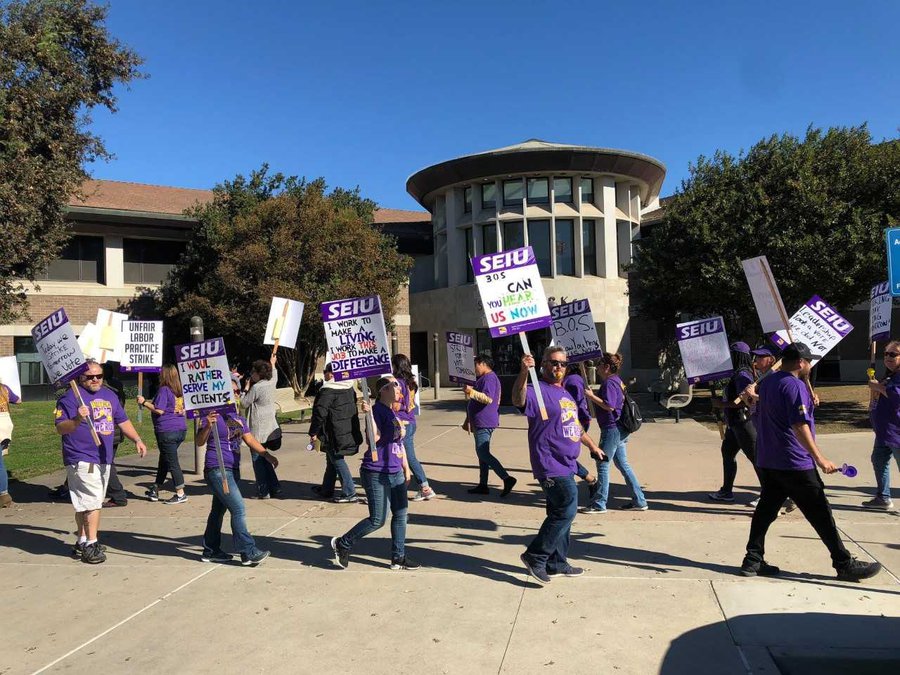Social workers and mental health specialists in Stanislaus County are demanding improved staffing and competitive pay — an unanswered request that has resulted in one strike already and another planned for next week.
Close to 700 county workers represented by Service Employees International Union Local 521 have been without a labor contract since July 1, and unsuccessful negotiations since then led employees to pick up their signs and hit the picket line on Nov. 5 in response to what they are calling “unfair labor practices.”
On Dec. 21, County workers of SEIU 521 announced a second strike is set to begin Jan. 3, 2019, if an agreement is not reached before then.
SEIU 521 members believe Stanislaus County departments which provide social services critical to the community are understaffed and underpaid, forcing workers to neglect their clients in order to keep up with their work as well as pushing away new hires who tend to leave and work for neighboring, higher-paying counties.
Within Child Protective Services, for example, Clark said there is a 30 percent turnover rate and 14 percent vacancy rate of Child Welfare social workers. Additionally, 50 percent of the County’s total vacancies are in the Behavioral Health and Recovery department, which provides services to homeless, substance abusers, the severely mentally ill, children in school with mental health issues and the elderly.
In the past three years, about 215 staff in social services — nearly one-third of SEIU 521 represented positions — have left the County for more competitive positions nearby.
“The services we provide, though they’re helpful and change lives…we don’t have the resources or the employees that we need in order to maximize all that we have to offer,” said Karyn Clark, a Behavioral Health Specialist with the County who also serves on SEIU 521’s bargaining team. “The average length of stay for graduates who have degrees is less than a year because of the conditions and amount of stress they’re working under.”
Clark said that SEIU 521 members are seeking a staff-to-client ratio that is manageable for workers. Due to high vacancies and employee turnover rates, many social workers and mental health specialists are currently responsible for up to 100 caseloads each. Employees are expected to make contact with their clients about once a month, according to Clark, but some cases require more attention than others.
“For one person to get to that many families, that many people each month…it seems humanly impossible,” she said. “It’s very stressful. There are certain documents and organizational skills needed, so we as workers spend a lot of time documenting and calling people together until sometimes the client is neglected because of all the other things that we’re having to do before we even make contact or engage with the client in the community.”
Despite attempts to partner with Stanislaus County management and ensure services for homelessness, mental health, substance abuse and child and elder abuse remain at their best, Clark said County management has violated the law, intimidating and discriminating against members who participate in union activity.
At the Dec. 12 Board of Supervisors meeting, SEIU 521 members spoke during public comment and shared an example of County management’s attempt to undermine the union’s efforts by providing a miscalculation of the cost of the union’s proposals.
Negotiations between union workers and County management picked back up again on Friday afternoon and could continue into the weekend. If no agreement is reached, the strike scheduled for Jan. 3 could last days, weeks or even months, Clark said.
“We’re hoping that we come to some type of agreement,” she said. “But we’ll be striking no earlier than January 3 until we can create some sort of bargain.
“That means offices will be closed and services will not be had. People won’t be able to have treatment necessary, rehabilitation services won’t be accessed and even children in abusive situations will stay in abusive situations because there are no service providers there to do what must be done for our community to be safe in a social service way.”





